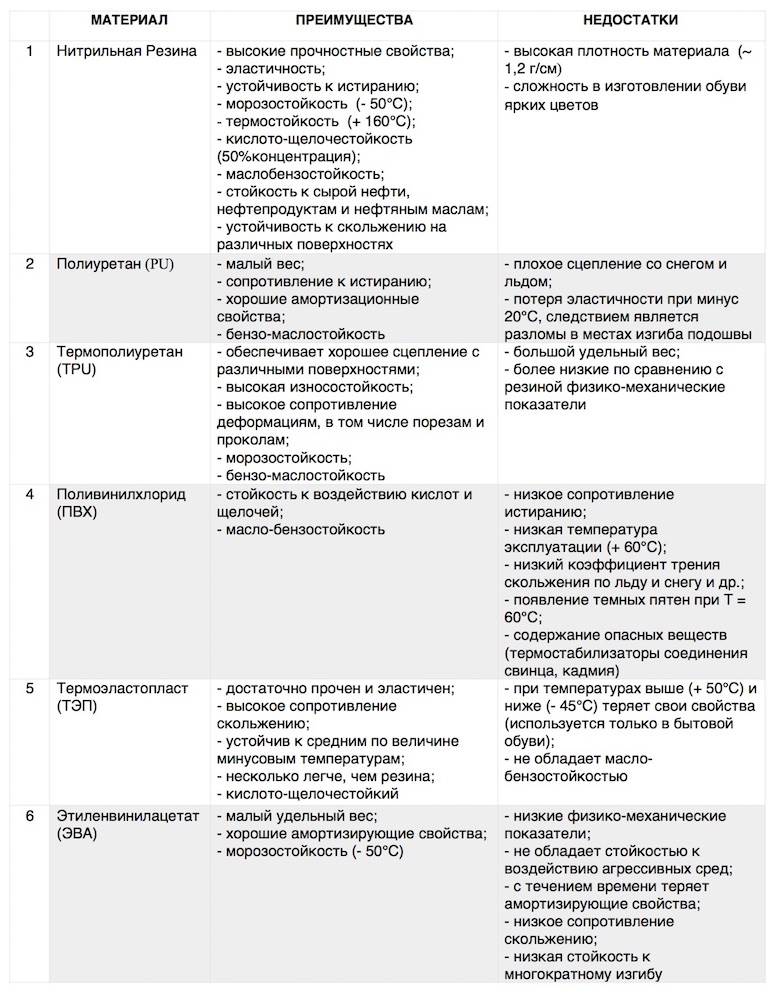Would you like tea or coffee? About the choice of polymer shoes
Unfortunately, some sellers, as well as consumers of special shoes, do not fully understand the difference in the materials from which these shoes are made and where these shoes are used. The approach to the selection of polymer shoes is very subjective and sometimes it is not entirely clear what criteria were used as a basis for conducting a tender and purchasing a particular shoe. Most often, the only criteria are cheapness and beautiful colors of shoes.
Many under the concept of "rubber shoes" mask any other shoes that are similar to rubber, but made of other materials in terms of quality and functionality.
So, PVC, RUBBER, POLYURETHANE boots. So what's the difference?
Of course, each raw material for the production of shoes has its own advantages, which manufacturers use to promote their products. The main consumers are enterprises that need moisture-proof shoes.
Each of the materials, be it PVC, PU or rubber, does an excellent job of moisture resistance. But in most cases, enterprises need additional protective properties, namely: dielectric, heat resistance, acid resistance, alkali resistance, oil frost resistance, oil and gasoline resistance, protection against mechanical damage, anti-puncture insole, anti-shock elevation. Important factors are also important: the weight of the boot and sliding in negative temperatures.
It is important to know that these characteristics are mainly inherent in rubber shoes. Yes, yes, it is made of rubber, no matter how banal it sounds. Let's understand the protective properties of each of the materials.
For complete objectivity, we will conduct a professional comparison of the technical characteristics of known materials: rubber, PVC, PU, TPU. So we will close many issues.

Very often, manufacturers of polymer shoes, especially manufacturers of PVC shoes, "give" themselves the characteristics of rubber, work on stereotypes in the minds of consumers. Sometimes it gets ridiculous: some "sellers" write and say that rubber is the last century, and now the latest development is rubber shoes. Obviously, these sad sellers do not have basic school knowledge of chemistry lessons. (Rubbers are the main component of rubber). If you look at the websites of such manufacturers, you can read — Factory of rubber shoes. You go to the site, and there is PVC or EVA, it doesn't even smell like rubber. The same story with "deliberate" misinformation of consumers by online stores: in the description of the product they write "rubber boots or rubber shoes", but in reality it is the same PVC or EVA. And it seems that special properties of shoes are not needed here, but this is at least misleading to buyers. Obviously, this is easier to convey to the buyer: rubber means moisture-resistant.
This type of misinformation has no right to exist in any industry, including the production and sale of special shoes. For example, TEA and COFFEE. It seems that both are drinks, but their properties, taste and taste are completely different. No one would guess to sell tea under the guise of coffee. And in production, this can lead to serious consequences.
In some corporate regulations of large state and private companies (especially in the oil and gas industry), and, as a result, in tenders, in the nomenclature of applications, "PVC rubber boots" are written. Yes, yes, this is exactly how an application for shoes is submitted: without a comma, without any semantic division. But these shoes are completely different in terms of characteristics!!! Rubber -this means from rubber, a PVC - from PVC. I really want to ask such applicants: So what do you need? Tea or Coffee?! This is, at least, unprofessional, and, at most, simply ignorance of the subject. And, if boots made of Rubber, PU, TEP, according to their characteristics, are considered special shoes, then shoes made of PVC do not have such "extreme" properties and are mainly suitable for protection against OPZ (general industrial pollution). As a result, serious enterprises purchase multi-colored, cheaper shoes that do not have sufficient protective properties!













